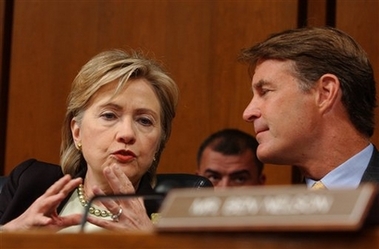Study: US should lower profile in Iraq
Updated: 2007-09-07 10:49
WASHINGTON -- US forces in Iraq should be reduced significantly, according to a new study on Iraq's security forces that inflamed debate in Congress on how quickly that can happen without hurling the country into chaos.
 Democratic Presidential hopeful, Sen. Hillary Rodham Clinton, D-N.Y., left, talks with Sen. Evan Bayh, D-Ind., during Senate Armed Services Committee hearing to discuss the Iraqi Security Forces Independent Assessment Commission's report, Thursday, Sept. 6, 2007, on Capitol Hill in Washington. [AP] |
The report, authored by a 20-member panel comprised mostly of retired senior military and police officers, said the massive deployment of US forces and sprawl of US-run facilities in and around Baghdad has given Iraqis the impression that Americans are an occupying, permanent force.
Accordingly, the panel said the Iraqis should assume more control of its security and US forces should step back, emboldening Democrats who want troop withdrawals to start this fall.
"Significant reductions, consolidations and realignments would appear to be possible and prudent," wrote the group, led by retired Gen. James Jones, a former Marine Corps commandant.
The recommendation echoed previous independent assessments on the war, including the high-profile Iraq Study Group that said the combat mission could be transferred to the Iraqis by early 2008. But the burning question, left mostly unanswered by the panel, was precisely when Iraqi security units could take control and US troops could leave.
The study concluded only that the Iraqis could not assume control of the country without US help in the next 12 to 18 months.
"We need to start transitioning to an Iraqi lead," no matter the timeframe, said retired Army Gen. George Joulwan, a panel member and former NATO commander in Europe.
"I think the signs are there to do that, and we have to reduce that dependency," he added in testimony before the Senate Armed Services Committee.
The study sparked ongoing debate among committee members on whether to pass legislation ordering troops home.
Democrats want a firm deadline to pressure Iraqi leaders into taking more control. Most Republicans have so far balked at the suggestion, saying military commanders should make the decision.
"There's a lot of people who are armchair generals who reside here in the air-conditioned comfort of Capitol Hill, who somehow do not trust the judgment of some of the finest leaders that our nation has produced," said Sen. John McCain, the top Republican on the Armed Services Committee and a GOP presidential hopeful.
Democrats and Sen. John Warner, R-Va., expressed skepticism that the Iraqis will reach the necessary political consensus without incentive.
|
|
|
||
|
||
|
|
|
|

